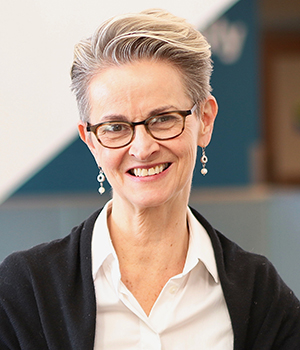FIMS News
Contact Information
FIMS Communications
Becky Blue
Email
519-661-2111x88493
FIMS & Nursing Building
Rm 2060C
A Message from the Dean
Winter/Spring 2023

To our wonderful alumni, hello and Happy Spring. I hope the season finds you, your families and communities doing well. Here at FIMS we’re in good shape, though we all feel the thrill and demand of the approaching end of term. It is a very lively place. Earlier this Winter, I had the privilege of seeing many MLIS alumni in Toronto at our reception at the Ontario Library Association annual conference, where we welcomed OLA President and FIMS Grad Library Director Melanie Mills. What a great occasion to visit with alum from the Classes of 1979 to 2022. Thank you all, and Melanie, our congratulations. We’ll continue the merriment as we approach the 25th Anniversary of our FIMS incarnation this Fall. More to come.
As I considered the message I wanted to relay in this Newsletter edition, I looked around at all the Faculty is doing in and beyond our curricula. There is so much going on, all of it joyful and asking essential questions about how the world can be. We kicked off the Winter term with a FIMS-hosted concert by renowned Indigenous vocalist and composer Jeremy Dutcher—a way to welcome our new undergraduate program, Creative Arts and Production (CAP), jointly offered with the Faculties of Arts & Humanities and Music. Dutcher is an amazing musician who was returning to solo piano and voice concerts for the first time since the start of the pandemic. We were blessed to have him relaunch at Western. From original songs composed and performed in dialogue with recovered Wolastoqey recordings made early in the early 20th century, to covers of Buffy Sainte-Marie hits and Joni Mitchell’s Cherokee Louise--a hard, beautiful song about Mitchell’s childhood friend—Dutcher held us and we held him. Eight hundred students, colleagues and community members, many of whom had travelled for hours to attend the free concert, joined Dutcher in rounds and chorus as he sang and taught us lyrics in Wolastoqey, words that have whole stories embedded in their syllables. The occasion was an opening onto an artist whose art, to quote author Hanif Kureishi, “is a form of integration into the world of others.” As Dutcher reminded us from his piano bench on stage at Alumni Hall, “all peoples have gifts.” We were transformed by Dutcher’s gifts on that cold January night.
Dutcher continued to honour us the following morning at Western’s Wampum Learning Lodge, a beautiful home, open to all, for Indigenous students, community and learning at Western. With Prof. Bimadoshka Pucan, who earned her PhD in anthropology from Western and now teaches at Concordia University, Dutcher offered a workshop on Indigenous language revitalization, the rematriation of Indigenous artifacts or ancestors (including a rattle rematriated to Pucan’s home community of Saugeen First Nation), and the stories about life and family that so many Indigenous students work hard to learn and to carry. We had a digital piano in the room, and Dutcher and Pucan sang, spoke and welcomed participants’ contributions. The Lodge - and our lunch! - were rich with illumination and good faith. Our thanks to collaborators Paula Cornelius Hedgepeth and colleagues in the Office of Indigenous Initiatives.
Since then, FIMS has hosted a full roster of scholarly and creative events, which you can take a look at here. Our public series, including our graduate-student hosted series Mediations, express our commitments to scholarship that speaks to the world, from the datafication of the everyday in Africa (see Avle, March 29), to women’s rights protests in Iran (see Zhang and Quan-Haase, April 20), to understanding stories of corporate scandal as capitalist routine (see Streeter, January 25), the housing experience of American/Indian/Alaska Native People in the urban US (see Locklear, February 8), hacking online virality (see Menczer, March 1) and Black disability activism (see Schalk and Thompson on March 2). At FIMS, we explore the relationship between theory, practice, history, and action in remaking our worlds.
In this issue of the Newsletter, you’ll read about other occasions we’ve hosted at the nexus of theory and practice, including welcoming celebrated broadcaster and journalist Carol Off, who is recent past host of As It Happens on CBC Radio. Carol spoke as our Clissold Lecturer for the MMJC program in November, and returned for a mini-residency in March. Since stepping down after 16 years at As It Happens, Carol is bringing her big-picture analysis to journalism’s role in protecting democracy against the global threat of autocracy. We look forward to continuing that conversation.
While Carol Off was upstairs in the Broadcast Studio, our CAP program welcomed actor, singer, composer, and music director Beau Dixon for a public workshop on creativity and creative process, convened in our beautiful Alumni Creative Commons. Dixon has a great range of accomplishments, and structured the workshop around two seasons of his Stratford Festival cabaret on Black freedom song.
In this issue, you’ll also read about Prof. Alissa Centivany’s scholarship—and her testimony in the House of Commons—on the right to repair—how we can change copyright law and return to “fixing our stuff” to the benefit of ourselves and our planet. Our beloved co-founder Prof. Catherine Sheldrick Ross, whom we miss, has changed us with a gift that will support Media Studies and Library and Information Science graduate students as they push our thinking and practice.
To our dear alumni from LIS to media studies, to health information science, journalism, and communications, you have been remaking the world for a long time. We salute and thank you.
Lisa Henderson
Dean, Faculty of Information and Media Studies


